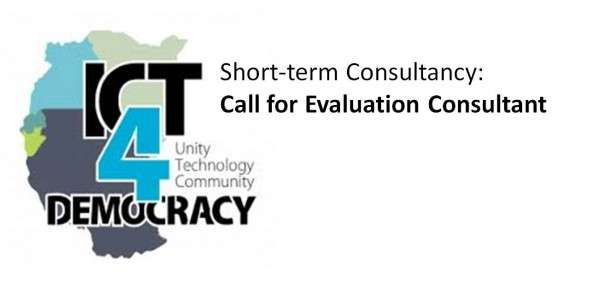The Collaboration on International ICT Policy in East and Southern Africa (CIPESA) is seeking an evaluation consultant to establish the achievements, outcome and challenges registered by the ICT4Democracy in East Africa Network during the period June 2016 to December 2018. The evaluation will assess the appropriateness, effectiveness and outcomes of the network in relation to the program objectives
Closing date for applications: 17:00 hours East African Time (EAT) on Friday December 7, 2018
Further details on the scope, eligibility and how to apply are available here.
Transparency International Uganda Acquires a Toll Free Line

Transparency International (TI) Uganda has completed the installation of a toll free call centre at its Lira field office. By calling 0800 200 188 toll free from any local mobile phone service provider, citizens can report on corruption and poor service delivery in the health sector in Northern Uganda.
Through the call centre and as part of its ICT4Health Service Delivery project, TI Uganda aims to reduce the rates of health worker absenteeism, increase community participation in monitoring the functionality of health centres and advocate for polices to improve health service delivery in the post conflict region.
This article was published on July 24, 2012, about the ICT4Democracy in East Africa project, which brings together various partners in the region
ICT for Democracy in East Africa: May 2012 News
Building capacity in monitoring services delivery and governance in Northern Uganda
The Collaboration on International ICT Policy in East and Southern Africa (CIPESA) in May undertook a small survey on the knowledge, attitudes, and needs of citizens regarding the utility, effectiveness, and security of using ICT for democracy in Uganda’s northern region. The survey involved individually administered questionnaires in Gulu town.
In addition, at the Gulu-based Northern Uganda Media Club (NUMEC), journalists, CSOs, local government officials and students participated in a CIPESA-organised discussion on how best ICT could be used to foster citizen participation given the economic, literacy, and other challenges faced by the region. The workshop participants deemed civic participation to be of more importance relative to political participation, as it often resulted into direct and tangible impacts on community livelihoods. Using CIPESA’s recently published report, the event also involved a practical exploration of how ICT tools could promote civic participation. One of the outcomes of the activities undertaken with NUMEC was a mapping of priorities and possibilities for engaging with particular ICT tools in selected service sectors.
NUMEC is one of the grassroots based centres involved in the iParticipate project. CIPESA has provided to the centre desktop computers, a digital camera and monetary contribution toward its internet connectivity.
Meanwhile, Transparency International Uganda field office in Lira district, unearthed uncoordinated health workers and support staff transfers at five health centres. The transfers were adversely affecting the performance of the already strained health centre staff. In follow up discussions, district health officials explained that the transfers were necessary in order to staff newly created health centres elsewhere. The officials acknowledged that the transfers were done without consultations with the affected health centres.
Table 1: Lira district health worker’s transfers (Source: Health Centre transfer records)
| Health Centre | Post | Replacement |
|
Amach health center IV
|
2 Nursing assistants |
NONE |
| 1 Enrolled Nurse | ||
| 1 Porter | ||
| 1 Watchman | ||
|
Barr Health Center III |
1 Nursing Assistant | |
| 1 Porter | ||
| 1 Watchman | ||
|
Aromo Health Center III |
1 Watchman | |
| 2 Enrolled Nurses | ||
|
Ogur Health Center IV |
1 Enrolled Nurse | |
| 1 Nursing Assistant | ||
| 1 Porter | ||
| 1 Watchman |
TI Uganda also unearthed cases of staff who absconded from duty and those who were drawing double salaries. The matter has been taken up with district health authorities.
The community is also being urged to monitor health centres to ensure efficient and effective service delivery. To this end, the installation of TI Uganda’s toll free call centre for reporting poor health service delivery in Northern Uganda is now complete. 0800 200 188 is being widely advertised in the region to inform and encourage the community to report health centre challenges.
Meanwhile, May’s Voluntary Social Accountability Committees (VSAC) meetings spearheaded by the Women of Uganda Network (WOUGNET) to report on governance and service delivery in five districts in Northern Uganda were complemented by radio programs. The Committee from Tarogali reported cases of Village Health Teams (VHT) being charged to receive bicycles which were actually provided free of charge by the Ministry of Health. Officials in Ibuje Sub County allegedly demanded UGX 70,000 (US$28) for each bicycle intended to ease the work of the health teams. The matter was debated on the local Radio Apac, leading to intervention by the Apac Anti-Corruption Coalition. The responsible officials were arrested, and the bicycles have since then been distributed free of charge to the targeted beneficiaries.
Besides, WOUGNET uploaded more content on their Ushahidi platform. Amongst the reports, drug shortages in Kole health centres, a security official who was extorting money from members of Chegere sub-county in Apac district, and a broken down bore hole in Alenga cell, Ibuje sub-county.
mGovernance and water in Kenya
iHub Research conducted in-depth analysis of data on Huduma, a web and mobile phone based platform for Kenyan citizens to voice the difficulties they encounter in using public services. Based on the results, the research team selected a thematic focus for the remainder of the mGovernance in Kenya project – governance in the Kenyan water sector. Preparations are underway for a workshop to bring together different water stakeholders in a single platform to discuss water issues and how to interact with each other in the chain of governance structure. The aim of the workshop is to evaluate the current feedback loop between stakeholders and the potential of technology, especially mobile, to enhance the Kenyan water sector.
ICT in human rights and democracy
In Tanzania, preparations are underway for a publicity campaign incorporating social media for the SMS for Human Rights System. The Commission for Human Rights and Good Governance (CHRAGG) is still in talks with the Tanzania Communications Regulatory Authority and leading telcos for short code sms provision and toll free services, respectively.
Meanwhile, 10 grassroots Human Rights Networks (HURINETs) in Kenya this month received equipment from the Kenya Human Rights Networks (KHRC). The equipment, including computers, portable internet modems and digital cameras is aimed at enabling the HURINETs use new media in human rights and democracy monitoring and reporting human rights violations. The work of the HURINETs will feed into KHRC’s civic action website.
Events
May 9 – 11, 2012: iHub research participated in the IST Africa Conference. Conference insights are shared by in two blog posts here and here
May 31, 2012: CIPESA participated in the Uganda National Civil Society fair and shared reports and work done in the democracy and governance session. The fair is an annual event organised by the National NGO Forum showcasing the contributions of different civil society actors to Uganda’s socio‐economic development and political growth.
June 26 – 29: In collaboration with the African Human Rights Consortium, KHRC is due to host the East African Region New Media and Human Rights Institute workshop.
This article was published on June 21, 2012, about the ICT4Democracy in East Africa project, which brings together various partners in the region – among them CIPESA.
For more information, visit www.ict4democracy.org
Digitalizing Democracy: Initiatives in East Africa
By: Caroline Wamala
A number of organizations in east Africa are using ICT to hold leaders accountable, fight corruption, monitor service delivery, and contribute to building a democratic culture. The East Africa ICT4Democracy Network, supported by Spider, was launched in June 2011 to enable the participating organisations to have stronger impact, build a more sustainable initiative, and further enhance people’s capacity to act and participate in democratic processes.
Participating organisations are:
- iHub, Kenya
- Women of Uganda Network,
- Kenya Human Rights Commission,
- Transparency International, Uganda
- Commission for Human Rights and Good Governance
- Collaboration on International ICT Policy for Eastern and Southern Africa, Uganda
For further information about the projects, visit www.ict4democracy.org.
The core problem is that despite the concerted efforts by international agencies, governments and local donors, ignorance prevails about human and citizen rights among the majority of communities. This perpetuates a culture of poor or bad service delivery across all sectors.
“In the developed world generally everyone is aware that water is a human right, health is a human right, in sub-Saharan Africa, or east Africa, people are unaware of these rights, clean water, or access to health is seen as a favour.”
Ashnah – CIPESA at M4D2012 New Delhi
Informing people about their rights to government services is the first step to engaging communities in holding their government accountable to better service delivery.
“So we are not just demanding accountability, we are making communities aware that you are entitled to freedom of expression, entitled to clean water, health etc. so we are engaging them, and they are participating, they are knowledgeable…we are going beyond survellieng and hold someone accountable.”
Ashnah – CIPESA at M4D2012 New Delhi
Are ICTs the road to democracy? While ICT can raise awareness on good governance, spread information on human and citizen rights and help monitor service delivery, it is “merely an amplifier, that acts within the environment it is embedded in. ICT is not the panacea none of our projects think or say that technology is the answer, technology is probably solving 5% of the problem, the other 95% requires us as a people to come together. As long as the cohesion and symbiotic relationships in this network continue these projects will explode into some serious change and become sustainable, we are working together and mobile technology is creating effective change and the same model can be applied in other places, we are building something by learning from each other.”
Angela and Hilda – iHub at the M4D2012 Conference in Delhi
Caroline Wamala is Project officer at Spider and post-doc researcher at Karlstad University.
This article was published by the Swedish Programme on ICTs for Developing regions (SPIDER) on April 18, 2012, about the ICT4Democracy in East Africa project, which brings together various partners in the region – among them CIPESA – Editor


